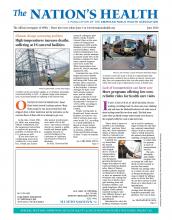
Glears, who advocates for people with IDD, speaks during an APHA event in April.
Ashley Glears, who works at The Arc of the United States, advocates for the equity and inclusion of people with intellectual and developmental disabilities. Glears, who was diagnosed with mild cerebral palsy at birth, is part of the IDD community and serves on APHA’s IDD Advisory Board.
What do you do at The Arc, and what initiatives does the organization have?
I’m the chapter associate and co-leader of the access, equity and inclusion team at The Arc of the United States. My role supports over 500 chapters across our organization to ensure that each chapter operates in alignment with the overarching mission, core values, guiding principles and position statements of The Arc.
We have initiatives like education, transportation and criminal justice. We also have community integration opportunities for people with disabilities. We focus heavily on policy.
What are common health issues for people with IDD?
Communication difficulties pose significant challenges, making it harder for individuals with IDD to express their needs and understand medical information, leading to potential misdiagnosis.
Sensory impairments, epilepsy and mental health disorders are also prevalent among individuals with IDD. Some people with disabilities have a dual diagnosis. They might have mental health issues as well.
People might have cerebral palsy and anxiety, or cerebral palsy and depression. So there’s overlap with health issues.
What are some additional barriers to health care?
The lack of equipment in the facilities to help the people with disabilities. Specifically, ramps or elevators. I just came from a facility yesterday where the door was super heavy, so I couldn’t open it.
Transportation is so big. Limited transportation can make it hard for people with disabilities to move around because they rely on public transportation so much. I know I do. This leads to financial constraints as well. It can make it difficult to travel to appointments, or any where in the community.
Stigma and discrimination within the health care system can lead to negative experiences for individuals with IDD. Inadequate training for health care providers on working with individuals with IDD further hinders access to quality health care.
How can health care providers support the IDD community?
We could all raise awareness or go to educational trainings to understand people with disabilities as a whole. We could also support organizations that help people with disabilities as well by going to panels and public health week. That’s a win-win for sure.
I want to emphasize the importance in really looking into the intersectionality of people. Recognizing that people have different identities like gender, sexuality and disability. Really understand the person to dismantle barriers for us all. That’s how we create equity, access and inclusion, particularly health equity for all.
This interview was edited for length and style.
- Copyright The Nation’s Health, American Public Health Association









